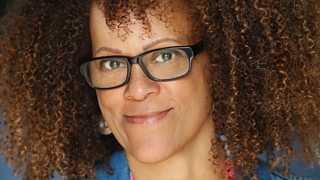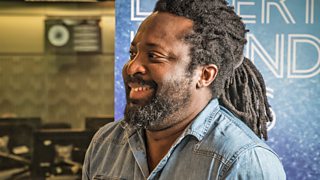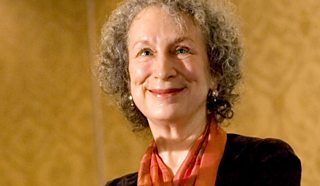10 things we learned from Bernardine Evaristo's Desert Island Discs
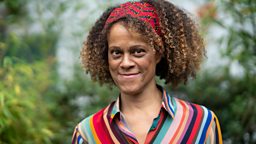
In 2019 Bernardine Evaristo won the Booker Prize with her eighth novel Girl, Woman, Other and is the first black British author to receive the trophy. Barack Obama named Girl, Woman, Other as one of his favourite reads of that year. She is also a critically acclaimed playwright and poet as well as a co-founder of Britain's first black women's theatre company.
This is what we learned from her Desert Island Discs.
1. Inclusion was the motivation for her Booker Prize-winning novel, Girl, Woman, Other
“I wanted to write a book that had as many black British women in it as possible,” explains Bernardine, “because there were so few of us getting published. And so we just weren't really present in British fiction, or fiction anywhere in the world, to be honest. So I thought, OK, I'm going to put 12 women in a novel and see how that works out.”
2. Writing was not a childhood ambition – but she had other dreams
Bernardine has said that there was nothing in her childhood that said she could be a writer. Her mother was a teacher, and her eldest sister followed that path and became a deputy head. And Bernardine? “I wanted to be a nun!,” she tells Lauren Laverne. “We used to go to church every Sunday. And I used to go to confession and confess my sins and I believed it all. I stopped going to church when I was 15. I come from a large family of eight kids and when each of us reached the age of 15, my mother said, ‘You can now make your own decision about whether or not you continue going to church,’ and every single one of us stopped going.”
3. Her love of Fela Kuti’s music comes from her father
“Even though my father was distant and a disciplinarian,” says Bernardine, “In the 1970s he would have parties - my mother and father would have parties - and they bring their Nigerian friends in... They would play King Sunny Adé and other African highlife musicians and also Fela Kuti, and my dad's friends would dance with us, the girls in the family. We kind of enjoyed the parties but we didn't like dancing with them because the tracks would go on for about half an hour. So if your dad’s old mates wanted to dance with you, it would go on and on, but now listening to Fela Kuti I love his long tracks because he just enjoys it.” Her Desert Island Disc by Fela Kuti is Zombie, which is over 12 minutes long.
4. Her local library inspired her passion for books and reading
“Oh, I loved it, loved it so much,” explains Bernardine. “I would go down to the library [in Woolwich, south London] every Saturday and pick up two or three books and read them during the week. Books opened up the world to me, and they were a form of entertainment, because I wasn't going anywhere. I just immersed myself in books and I was a good reader. And it was free. We didn't have many books in the house. We had like a tiny, tiny bookshelf with some very old books. I don't know what they were.”
5. Discovering Alex Haley’s novel Roots was a key moment
“I remember reading Roots when I was 15,” says Bernardine, “which was the epic novel about slavery and there was an accompanying television series. I remember getting that book and reading it and that made a really lasting impression, because that was actually the first black book I read, because the other books were all white books, because that's what was around at the time.”
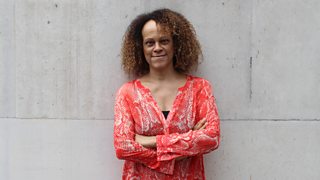
And the truth is I wanted that prize so much... because I knew it was going to change everything. And so when he said my name, the room exploded, which was really niceBernardine on winning the Booker Prize
6. Acting rather than writing excited Bernardine as a teenager
“I went to the local youth theatre, Greenwich Young People's Theatre,” says Bernardine. “It was a 10-minute walk from my house, and it was in a big old church, and I just absolutely loved it from pretty much the minute I walked in the door. It was fun. I think that's what it is when you're a child, when you're acting - it's not about wanting to be a great performer. I have no memory of wanting to be a great performer at the beginning... I just remember it being a very freeing experience for me.” This teenage enthusiasm led to a place at the Rose Bruford College of Speech and Drama.
7. The head of her drama college said her first play was the best piece of theatre he’d even seen
“He did! It was really short and it was basically an explosion of rage,” says Bernardine. “It was called the N word. And I jumped onto the stage and I shouted that word out really loudly. And then I say something like ‘Too black, not black enough, too white, not white enough’ and then some other things and then jump off the stage. So it was really short. And it was probably very powerful. He probably hadn't seen anything like it before. It really was a very vicious word then. And I was basically saying, this is how I'm seen. This is what I might be called. But where do I stand because I'm a mixed race person. Not a very sophisticated piece of theatre, but punchy.”
8. How did Bernardine react when she found out she’d won the Booker Prize?
“I released a stream of expletives,” laughs Bernardine. ”I literally swore the house down. It was so astonishing and exhilarating. The build-up to it that day had been enormous. And then there's a big banquet, and it just goes on, and on and on. And then at 10 o'clock, the announcement is made and the chair of the judges announced Margaret Atwood, and he said, there's going to be two [winners] and I was like, 'Oh my god, who's going to be the second person?' And the truth is I wanted that prize so much. I can't be cool about it. I wanted it so much, because I knew it was going to change everything. And so when he said my name, the room exploded, which was really nice.”
9. She’s not sitting on any more diversity panels
Bernardine says she will no longer take part in discussions or groups talking about how to increase diversity within the creative industries. “But I can drop tweets, though, which have even more impact actually,” she says. “There are two things going on. One is the people who most care about change are the people who are most adversely affected by the status quo. And the other thing, is that the people who can make the biggest difference are the people in positions of power, and they are the people who may not feel that they are directly adversely affected by the fact that people have been excluded. If we're talking about race, for example, white people need to be on board and to be at least party to the conversations we have around race.”
10. As a Professor of Creative Writing, Bernardine has some clear advice for her students who want lifelong careers.
Bernardine tells her students that they need to make themselves unstoppable. “I did what I love doing. First of all, it was the theatre,” says Bernardine. “And then it was becoming a writer, and publishing books and finding ways to support myself by working in arts management, and then eventually having a portfolio career. I still do write book reviews, I write essays. I do a lot of touring, which is paid, but it's all around literature. And in that way, I was able to support my passion. And I think the key to becoming unstoppable is to do what you love doing. And to develop your skills and to never give up.”

